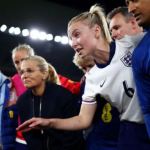Host nation Germany is riding a resurgent wave of hope with the Euro 2024 tournament opener against Scotland just days away.
After two consecutive World Cup group stage exits and a loss to England in the last 16 of the Euros in 2021, Germany endured a challenging 2023 with just three wins in 11 games.
Many predicted an embarrassing early exit for the three-time Euros champions on home soil. However, sentiments have shifted over the past four months.
Germany’s recent 0-0 draw with Ukraine in Nuremberg showcased their potential, particularly during a dominant second half where they spurned several chances. “You’d prefer to win,” coach Julian Nagelsmann said after the match. “But the most important factor is that I want to see a team which wants to win. Today, we wanted that victory.”
The team was without four key players, including Toni Kroos, who played for Real Madrid in the Champions League final the previous Saturday. Debutant striker Maximilian Beier came close to scoring, while youngsters Florian Wirtz and Jamal Musiala demonstrated they can form a formidable attacking duo.
Other selections by Nagelsmann, such as Stuttgart’s Chris Fuehrich and Maximilian Mittelstaedt, also impressed, indicating the coach has assembled a strong squad ahead of the tournament.
The improved performance on the pitch and the growing optimism off it will bolster Germany’s confidence as they aim for a fourth Euros trophy, which would break their tie with Spain for the most titles.
Germany will face Greece in their final friendly on Friday in Moenchengladbach, but sterner tests await if they are to reach the later stages of the Euros.
“Perfect” getting ready
Taking over in late 2023 after Hansi Flick became the first coach in Germany’s history to be sacked, Julian Nagelsmann initially struggled, winning just one of his first four games.
In response, Nagelsmann shook up his squad, leaving out 11 players and bringing back 2014 World Cup winner Toni Kroos, who had retired from international duty in 2021.
Instead of relying on big names from powerhouse clubs Bayern Munich and Borussia Dortmund, Nagelsmann’s squad included many players from Bayer Leverkusen, who were on their way to a Bundesliga title, and Stuttgart, who finished as surprise runners-up.
This focus on selecting players based on form paid off, as Germany delivered convincing performances to beat two Euro 2024 contenders, France and the Netherlands, in March.
Germany will face Scotland, Hungary, and Switzerland in the group stages—three teams they are now expected to beat. Nagelsmann noted that the Ukraine match was “perfect in view of the games which await us in the group phase.” Veteran Thomas Mueller, heading into his fourth Euros, expressed confidence despite the goalless draw, stating there was “no reason to be nervous.”
Germany’s preparation appears well-timed, with Nagelsmann’s strategic squad selections and recent strong performances suggesting they are ready to compete effectively.
As the host nation, they will benefit from home support and are aiming to add a fourth Euros trophy to their history, which would break their tie with Spain for the most titles.
The final friendly against Greece will serve as another opportunity to fine-tune their strategy before the tournament begins.
– ‘Great support’ –
After enduring difficult years, the German public has rallied behind the national team on the eve of the tournament. Departing from the usual routine of squad announcements via traditional press conferences, the German Football Association (DFB) adopted a fresh approach.
They unveiled the team player-by-player through various media channels, including TV personalities, influencers, and celebrities, effectively reaching a new and diverse audience.
Star midfielder Florian Wirtz’s selection was revealed during a concert by musician Nina Chuba, while Real Madrid defender Antonio Ruediger’s announcement came via a video from his favorite kebab shop in Berlin. The innovative approach generated excitement and engagement among fans.
In late May, over 15,000 supporters filled a stadium in the central German town of Jena to watch the team train, with an additional 16,000 fans tuning in via live stream. This overwhelming show of support deeply resonated with coach Julian Nagelsmann, who acknowledged the enthusiasm of the public for their team.
Nagelsmann emphasized that they would carry this great support with them throughout the tournament, drawing strength from the unwavering backing of their loyal fans.



